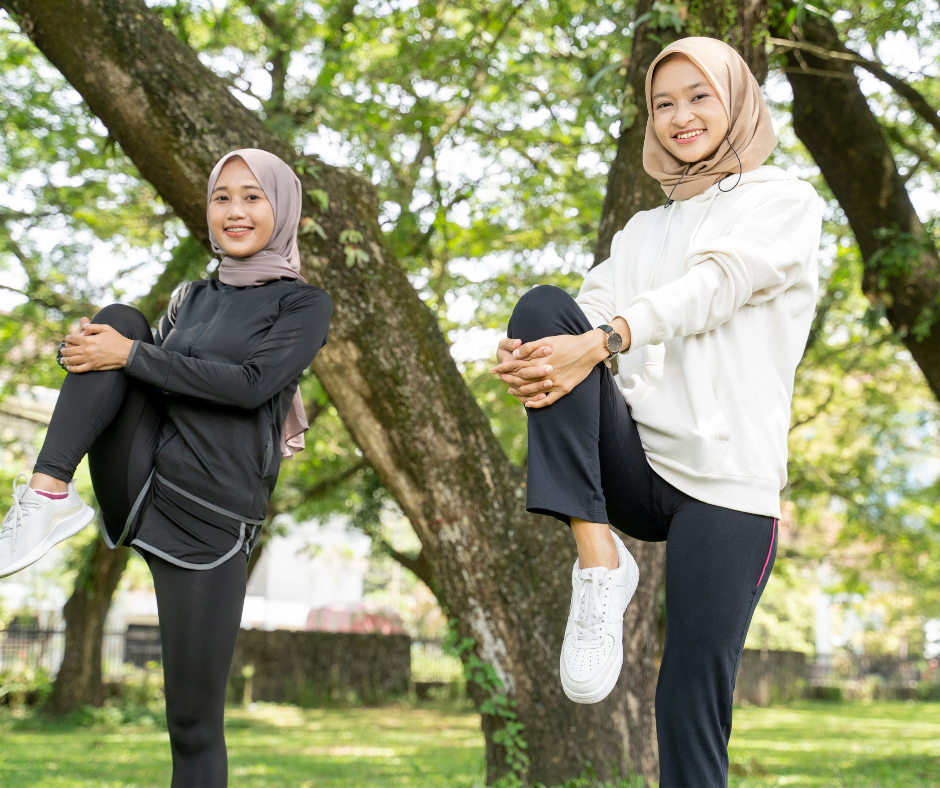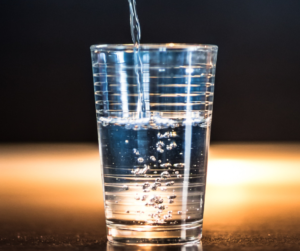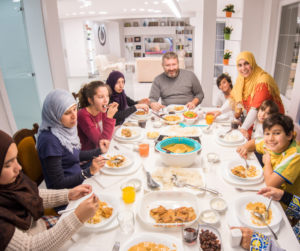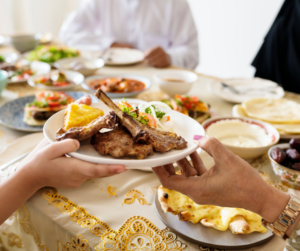Maintaining your running fitness during Ramadan can be difficult when one is not able to eat or drink water between sunrise and sunset.
By hydrating adequately when possible, consuming nutritious meals when breaking the fast, by reducing your training intensity and volume, and by listening to your body’s needs, one can maintain their running fitness throughout the month of Ramadan safely and sustainably…
In this article, we are going to share our best advice on how to maintain your training safely throughout Ramadan…

1. Best Time Of The Day To Train During Ramadan
The best time to train during Ramadan really depends on your personal preference and what feels best for your body.
The different time options for training during Ramadan are:
- In the early evening before sunset.
This option entails training on an empty stomach and with no water but it does allow you to eat and drink directly after your session.
- After your evening meal.
For those who can stay up this late and can sleep 1 to 2 hours after training, this is an ideal option as you can eat and hydrate before and after your training session.
- In the morning right after sunrise.
This option allows you to eat before you train which means more energy for your training session, but you do have little opportunity to refuel, rehydrate, and recover after this session
- Early in the morning right before sunrise.
This option allows you to consume food and water before and after your morning training session if you manage to complete it before the sun rises.
This Is The SAFEST Time To Train During Ramadan
2. Training Intensity & Volume During Ramadan
You must try to avoid high-intensity training during the entire fast.
Pro Tip: You need to take out the intensity and moderate the volume of your runs, personally I prefer running in the evening during Ramadan, breaking fast with a very small meal and some water, then heading out for a 45-60min run and then eating again and drinking after (and during the run).
Starting with lower-intensity and shorter-duration workouts, and gradually building up as the body adapts to the changes is what we recommend.
The most important thing to remember is that not everyone will react the same to their fasting and that’s why you need to start at a low intensity and see how your body reacts.
3. Hydration Strategy During Ramadan
It’s vital that you hydrate adequately to compensate for the body fluids lost while you are training or when you are fasting.
It is unlikely that mild dehydration associated with Ramadan will negatively affect short-term exercise, i.e. under one hour. This may not be the case during longer-duration events especially if these events take place in high ambient conditions.

Athletes during Ramadan should make increased efforts to ensure that exercise is commenced euhydrated and that rehydration occurs as soon as it is feasibly possible.
This is really only a problem when exercise is performed prior to the Iftar meal. It may also be an option to utilize cold mouthwashes during exercise to help prevent feelings of thirst, however, this again will require discussion with religious authorities.
It is important to remember that rehydration should not only be focused on the restoration of fluids but also must consider the specific electrolytes that will be lost especially sodium.
This may involve the addition of electrolytes to fluids especially if athletes have performed prolonged exercise in the heat prior to the Iftar meal.
Drinking sufficient fluids from Iftar until Suhoor is crucial while taking into consideration the need for additional electrolytes. This can be done either by drinking rehydration solutions or by drinking and eating at the same time. This will help your body to retain water.
It should be noted that it would be unwise to attempt to hyperhydrate by drinking copious amounts of water at the Suhoor meal as this can lead to prompt diuresis and ultimately could contribute to further dehydration.
Athletes can easily determine whether their hydration plan is sufficient to balance their losses by checking body weight, and monitoring the color and amount of urine produced, especially in the morning (urine should be clear and of a normal volume).
4. Look Out For The Warning Signs Of Dehydration
Throughout Ramadan and especially if you are training during Ramadan, keep a close eye for dehydration symptoms, as soon as you start to notice any of the symptoms listed below you should consult a doctor immediately.
- Dry and wrinkled skin
- Feeling exhausted
- Unable to concentrate
- Dizziness
- Constant fatigue
- Sleeping more than usual
- Dark Urine
5. Nutrition Strategy During Ramadan
Taking in appropriate amounts of carbohydrates and proteins before and after exercise is vital if you want to recover and perform adequately while training during Ramadan.
We recommend breaking the fast with soup, then consuming water, and then waiting a few minutes before eating your main meal. This will help you feel fuller for longer.
Pro Tip: Avoid processed, and salty foods as these will not keep you full and will dehydrate you.

Recommended Foods To Eat When Breaking the Fast:
At least one hour before starting training, favor easily digestible food such as…
- Cereal bar
- Slice of gingerbread
- Rusk
- Fruit puree
- Plain yogurt
Many common foods associated with Iftar are rich in carbohydrates (e.g. figs/dates) and high-quality protein (milk and laban yogurt).
The substantial meal after prayers typically features savory dishes with carbohydrate-rich components (rice) and protein (meat or fish).
Arab breads and other varieties provide worthwhile amounts of carbohydrates. Other combinations of carbohydrate and protein include Thareed (bread containing), starch pudding (milk), and rice porridge
Care should be taken with Ramadan treats, since many are very high in fat. Some recipes can be adapted to promote carbohydrate content and reduce fat (e.g. replace puff pastry in Um Ali with bread).
Ma’amoul, dried fruits, and nuts are suitable snacks.
When eating opportunities are limited, drinks with high energy/nutrient density can be useful to meet high-energy requirements. These include special nutrient feeds used in clinical nutrition situations, liquid meal supplements, and fruit/milk smoothies.
Many of the special Ramadan drinks (e.g. Jellab) are energy-rich and those based on milk/laban also provide high-quality protein.
Sohoor meals that are high in carbohydrates include rice with egg, cheese, and milk. Beans and foul while good sources of many nutrients may not be suitable if consumed close to a training session.
6. How to Listen To What Your Body Needs During Ramadan
Always remember that everyone will have different responses to fasting so listen to your body and adjust accordingly.
Take into consideration…
- Your energy levels when you wake up in the morning
- Your energy levels when you go to sleep at night
- How do you feel doing your normal daily tasks
- Your length and quality of sleep
- How your training sessions are going
- Your mood and emotional state
7. Increase Your Rest Days
Without your body recovering fully, it will cause more fatigue that is carried over to the next training session.
It takes time for the body to repair the muscle fibers and make improvements after sessions, especially during Ramadan, so don’t feel bad to take an extra rest day if you feel that it’s what your body needs.
If you find that you are struggling to fall asleep and are feeling fatigued then you need to add more rest days into your weekly schedule.
Remember, fasting during Ramadan requires self-discipline and sacrifice, but you don’t have to sacrifice your well being so rest as much as you feel you need to.
8. Indoor Training Is An Option
Depending on what you enjoy and how you’re feeling on the day as well as the weather and temperature. It may be a viable option to train indoors and gain the benefits of preventing dehydration and if you’re in a gym, training in an airconditioned room will help as well.
9. Chat With An Expert
Chatting to an expert will ensure that you don’t have your training intensity and volume set too high and they will also help keep you on track to maintain your fitness levels in the safest way possible,
Here at Coach Parry, we don’t believe in ‘one size fits all’ coaching. Every runner we deal with is unique, with different abilities and challenges. We believe training programs should be written to suit the athlete instead of the athlete trying to fit into the training program. That’s why we will create a plan adjusted for your needs during Ramadan.
How To Mentally Prepare For Training During Ramadan

The month of Ramadan is when Muslim people are meant to self-reflect and focus on their relationship and devotion to their spiritual leader. It’s a challenging time because a lot of self-control has to be practiced.
To set the goal to continue training on top of that is even more of a challenge and will test their mental and physical limits.
I think the best thing you can do is just accept that you’re not going to be doing any high-intensity sessions and that you will be resting a lot more than normal, which is perfectly okay.
For most, observing Ramadan throughout the month is bigger than any other goal at that moment in their lives.



Comments are closed.